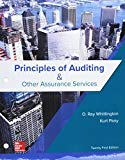
GEN COMBO LL PRINCIPLES OF AUDITING & OTHER ASSURANCE SERVICES; CONNECT AC
21st Edition
ISBN: 9781260427202
Author: Ray Whittington, Kurt Pany
Publisher: McGraw-Hill Education
expand_more
expand_more
format_list_bulleted
Question
Chapter 5, Problem 39QRA
a.
To determine
Explain the use of analytical procedures in the given cases.
b.
To determine
List five information sources that are available to the auditors in developing expectations for analytical procedures.
c.
To determine
List four techniques which help the auditor in developing expectations for analytical procedures.
Expert Solution & Answer
Want to see the full answer?
Check out a sample textbook solution
Students have asked these similar questions
final answer is
total cost of work in process.
Kindly help me with accounting questions
Chapter 5 Solutions
GEN COMBO LL PRINCIPLES OF AUDITING & OTHER ASSURANCE SERVICES; CONNECT AC
Ch. 5 - Prob. 1RQCh. 5 - Prob. 2RQCh. 5 - Prob. 3RQCh. 5 - Distinguish among routine, nonroutine, and...Ch. 5 - Prob. 5RQCh. 5 - Prob. 6RQCh. 5 - Prob. 7RQCh. 5 - As part of the verification of accounts receivable...Ch. 5 - Prob. 9RQCh. 5 - When in the course of an audit might the auditors...
Ch. 5 - Prob. 11RQCh. 5 - Prob. 12RQCh. 5 - Prob. 13RQCh. 5 - Prob. 14RQCh. 5 - Prob. 15RQCh. 5 - Prob. 16RQCh. 5 - Prob. 17RQCh. 5 - Prob. 18RQCh. 5 - Prob. 19RQCh. 5 - What disclosures should be made in the financial...Ch. 5 - Prob. 21RQCh. 5 - Prob. 22RQCh. 5 - Prob. 23RQCh. 5 - Prob. 24RQCh. 5 - Prob. 25RQCh. 5 - Prob. 26RQCh. 5 - Prob. 27RQCh. 5 - Prob. 28RQCh. 5 - Prob. 29RQCh. 5 - Prob. 30RQCh. 5 - Prob. 31RQCh. 5 - I have finished my testing of footings of the cash...Ch. 5 - Prob. 33RQCh. 5 - Prob. 34RQCh. 5 - Financial statements contain a number of...Ch. 5 - Prob. 36QRACh. 5 - In an audit of financial statements, the auditors...Ch. 5 - Prob. 38QRACh. 5 - Prob. 39QRACh. 5 - Prob. 40QRACh. 5 - Prob. 41QRACh. 5 - Prob. 42QRACh. 5 - Prob. 43QRACh. 5 - Prob. 44QRACh. 5 - Prob. 45AOQCh. 5 - Prob. 45BOQCh. 5 - Prob. 45COQCh. 5 - Prob. 45DOQCh. 5 - Prob. 45EOQCh. 5 - Prob. 45FOQCh. 5 - Prob. 45GOQCh. 5 - Prob. 45HOQCh. 5 - Prob. 45IOQCh. 5 - Prob. 45JOQCh. 5 - Prob. 45KOQCh. 5 - A difference of opinion concerning accounting and...Ch. 5 - Prob. 46OQCh. 5 - Prob. 47OQCh. 5 - Prob. 48AOQCh. 5 - Prob. 48BOQCh. 5 - Prob. 48COQCh. 5 - The cost of analytical procedures in terms of time...Ch. 5 - Prob. 48EOQCh. 5 - Prob. 49OQCh. 5 - Prob. 50PCh. 5 - Prob. 51PCh. 5 - Prob. 52PCh. 5 - Prob. 53PCh. 5 - Prob. 54PCh. 5 - Prob. 55PCh. 5 - Prob. 56P
Knowledge Booster
Similar questions
- Do fast answer of this question general Accountingarrow_forwardJohn was a civil servant with the Trinidad & Tobago (T&T) Government for over 30 years and retired 5 years ago. He is in receipt of a monthly pension. John also received a lump sum on retirement and invested part of this in a small retail business in downtown San Fernando. He retails designer clothing and perfumes and manages to make a modest profit, after deduction of business expenses. John invested the remainder of his pension lump sum in the Unit Trust Corporation of Trinidad and Tobago and is in receipt of monthly dividends. John receives a monthly pension of $6,000. The retail business has a financial year- end of 31 December and in the fiscal year 2011 he made a taxable profit of $100,000. In the fiscal year 2011 in T&T there is a personal allowance of $60,000 and the rate of Income tax is 25%. John no longer qualifies for any of the other deductions available to individuals and receives his pension after deduction of tax under the P.A.Y.E. system. In 2011, John…arrow_forwardPlease provide solution this financial accounting questionarrow_forward
arrow_back_ios
SEE MORE QUESTIONS
arrow_forward_ios
Recommended textbooks for you
 Auditing: A Risk Based-Approach (MindTap Course L...AccountingISBN:9781337619455Author:Karla M Johnstone, Audrey A. Gramling, Larry E. RittenbergPublisher:Cengage Learning
Auditing: A Risk Based-Approach (MindTap Course L...AccountingISBN:9781337619455Author:Karla M Johnstone, Audrey A. Gramling, Larry E. RittenbergPublisher:Cengage Learning Auditing: A Risk Based-Approach to Conducting a Q...AccountingISBN:9781305080577Author:Karla M Johnstone, Audrey A. Gramling, Larry E. RittenbergPublisher:South-Western College Pub
Auditing: A Risk Based-Approach to Conducting a Q...AccountingISBN:9781305080577Author:Karla M Johnstone, Audrey A. Gramling, Larry E. RittenbergPublisher:South-Western College Pub

Auditing: A Risk Based-Approach (MindTap Course L...
Accounting
ISBN:9781337619455
Author:Karla M Johnstone, Audrey A. Gramling, Larry E. Rittenberg
Publisher:Cengage Learning

Auditing: A Risk Based-Approach to Conducting a Q...
Accounting
ISBN:9781305080577
Author:Karla M Johnstone, Audrey A. Gramling, Larry E. Rittenberg
Publisher:South-Western College Pub